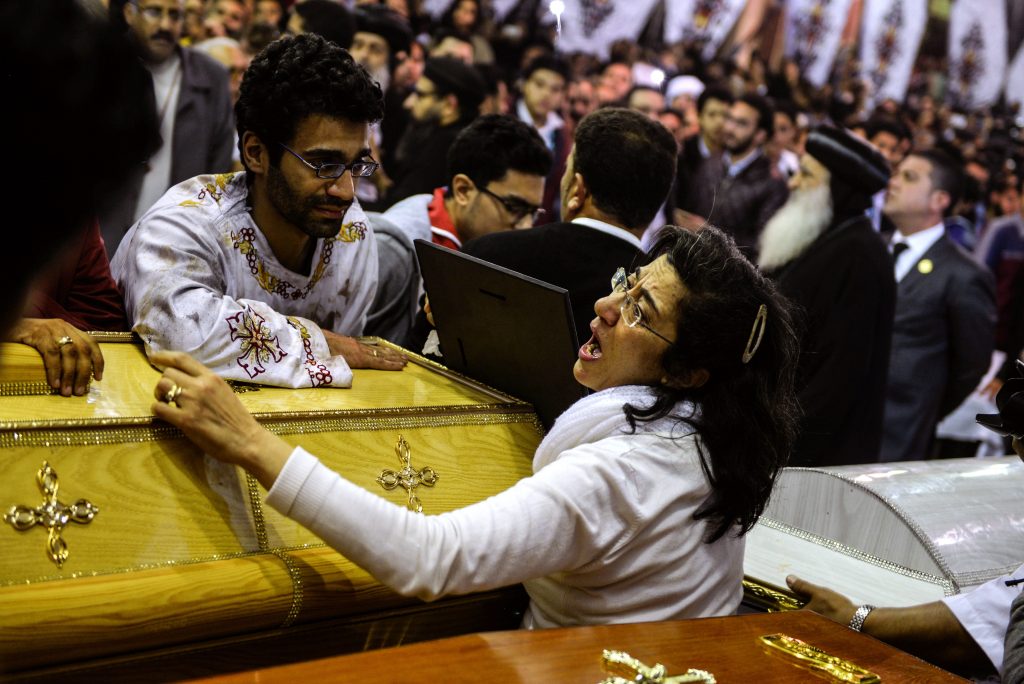“Excuse me. Do you know where I can talk to someone about making a donation to help the people and restore the church in Egypt?”
A man addressed me at the back of St. Mary and St. Mark, a Coptic church in Manhattan. I explained I wasn’t quite sure — we had both come through the open doors, one day, midday, after the Palm Sunday terrorist attacks on two Coptic churches in Egypt. He left it in the generic offering box in the back.
St. Mary and St. Mark is a church in transition, with a history. As you notice when Italian-born Mother Francis Xavier Cabrini seems to usher you in with a wave from the mosaic on the right, the sure sign of an Italian-immigrant past to the place.
If you Google, it won’t take too long to find that it was just last month that the New York Times ran a story about the sadness of those who used to know this as Our Lady of Peace, a Roman Catholic parish. It merged in 2015 — with St. John the Evangelist, the church at the base of the Archdiocese of New York’s chancery building — and this particular church was closed. And it was only recently leased — in time for Lent — to the Coptic Church to become their cathedral in the New York and New England parts of the U.S.
And it’s certainly already got prayer going on there. As the faithful gathered were consoling me with their presence of prayer, the words they were praying were of comfort and hope. And the welcome did not stop with the open doors. Plenty of new Holy Paschua prayer books are available in English, Coptic, and Arabic, and pray-ers will show you where to look to join them. And so I opened to the two pages with Isaiah 40:1-5: “Comfort, yes, comfort my people, says your God.” And Psalm 64: 4, 6: “Hearken to us, O God our Savior, the hope of all the ends of the earth. Blessed is he whom you have chosen and adopted; he shall dwell in your courts forever. Alleluia.”
Alleluia! That blessed word Christians are only days away from proclaiming in earnest, in unison, in abundance, with joy: Alleluia. What words we pray those martyred in Egypt over the weekend say in their new life, upon seeing the face of God. Alleluia. God be praised! In heaven, in a language more powerful than any one we speak here on earth, as the Holy Spirit does for us, when we let him, with the desires that are too deep for words, as Scripture tells us.
And Alleluia that there is prayer happening in Manhattan. Open doors, opening doors into deeper life in the Trinity.
Monday was also Reconciliation Monday in New York — priests available for confessions from 3-9 p.m. in Roman Catholic churches around the Archdiocese of New York and Brooklyn, too. The New York Times used the word “betrayal” to describe the feelings people were feeling upon their parish closing and taking on a new life, a revification in a new tradition, so close and yet so foreign sounding, too, to our own. When I pondered the reality of closing Catholic churches, I thought about the real betrayal — my own! Calling to mind that Chesteron line about “what’s wrong with the world? Me!” Church closing and changing realities and influence are an opportunity for examination of conscience. For every member of the mystical body of Christ. How is our faith? Do we overwhelm people with it? Why aren’t we drawing more people to him by the beauty of our witness? Are we inviting and welcoming with the truth of Jesus Christ? Do we proclaim him with joy?
On Sunday, while praying in petition and solidarity with the Copts, Cardinal Timothy Dolan during his brief Palm Sunday homily at St. Patrick’s Cathedral implored us to quit being so “bipolar.” One moment we’re hailing Jesus, the next we’re insisting he be crucified, as we read the crowd’s part in the passion reading. Isn’t that the problem? We’re not consistent. It takes away from our credibility. And isn’t that exactly why we need Jesus, our Savior? Because we are sinners in need of him, of saving!
God insisted we were worth dying for so that we may truly live. That’s love. He’s love. And love himself is worth dying for.
Most of us won’t be martyred like those almost 50 people were on Sunday. So let’s join together in prayer this week — and alongside our Coptic and other persecuted brothers and sisters if we can — to have courage in every little thing.
As Paul VI put it: “Jesus Christ is the beginning and the end, the alpha and the omega, Lord of the new universe, the great hidden key to human history and the part we play in it. He is the mediator — the bridge, if you will — between heaven and earth. Above all he is the Son of Man, more perfect than any man, being also the Son of God, eternal and infinite.”
He said this in a homily about his call to proclaim Christ always. That’s the Christian call. That’s the invitation of this holiest week on the Christian calendar. Christians, let’s try together with his sacramental grace to proclaim Him always. Like the open doors of the new Coptic cathedral in New York — and the confessionals with lights on — let us always be inviting, with joy, knowing his mercy.
In their deaths, the Coptic Egyptians show us who we were made to be, who we Christians profess to be.

